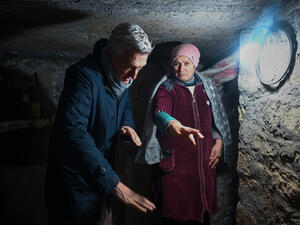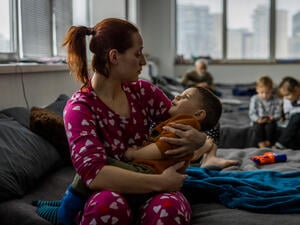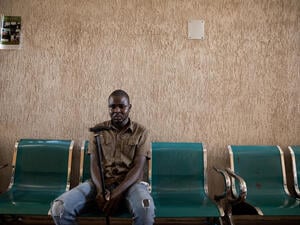Number of forcibly displaced rises to 43.3 million last year, the highest level since mid-1990s
Number of forcibly displaced rises to 43.3 million last year, the highest level since mid-1990s
BERLIN, Germany, June 15 (UNHCR) - Annual figures released Tuesday by the UN refugee agency show that some 43.3 million people were forcibly displaced worldwide at the end of 2009, the highest number of people uprooted by conflict and persecution since the mid-1990s.
At the same time, according to the 2009 Global Trends report, the number of refugees voluntarily returning to their home countries has fallen to its lowest level in 20 years. UN High Commissioner for Refugees António Guterres, commenting on the figures during an address in Berlin on Tuesday, said "last year was not a good year for voluntary repatriation."
The report also indicated that overall refugee numbers remained relatively stable at 15.2 million, two thirds of whom come under UNHCR's mandate while the other third fall under the responsibility of the UN Relief and Works Agency for Palestine Refugees in the Near East. More than half of the refugees under UNHCR's care, or 5.5 million people, are in protracted situations.
Commenting on the voluntary repatriation figures - 251,000 last year against a norm over the past decade of around 1 million people per year - Guterres noted that "major conflicts such as those in Afghanistan, Somalia and the Democratic Republic of Congo show no signs of being resolved. Conflicts that had appeared to be ending or were on the way to being resolved, such as in southern Sudan or in Iraq, are stagnating."
The High Commissioner, addressing the annual Berlin Symposium for Refugee Protection on the first day of his second five-year mandate, added that "already a majority of the world's refugees have been living as refugees for five years or more. Inevitably, that proportion will grow - if fewer refugees are able to go home."
The 2009 Global Trends report said the number of people uprooted by conflict within their own country grew by four per cent to 27.1 million at the end of 2009. Persistent conflict in the Democratic Republic of the Congo, Pakistan and Somalia mainly accounted for the increase in the overall figure.
The annual survey also noted that more and more refugees are living in cities, primarily in the developing world, contrary to the notion that refugees are inundating industrialized nations.
The number of new individual asylum claims worldwide grew to nearly 1 million, with South Africa receiving more than 222,000 new claims last year, making it the single largest asylum destination in the world.
The annual Global Trends report, which reviews statistical trends and patterns of conflict-related displacements, also covers stateless people. The number of people known to be stateless at the end of 2009 was 6.6 million though unofficial estimates range as high as 12 million.
UNHCR protects, assists and seeks solutions for refugees. The persistence of conflict makes voluntary return to countries of origin, the solution preferred by host countries and refugees alike, more difficult.
With resettlement - through which refugees hosted in one asylum state, usually in the developing world, are permanently relocated to another state, usually in the developed world - UNHCR submitted a record 128,000 individuals for resettlement in third countries, the highest level in 16 years.
At the end of 2009, 112,400 refugees were admitted for resettlement by 19 countries, including the United States (79,900), Canada (12,500) and Australia (11,100). The main refugee groups resettled in 2009 were from Myanmar (24,800), Iraq (23,000), Bhutan (17,500) and Somalia (5,500).
Meanwhile, High Commissioner Guterres outlined some of the challenges and priorities during his second term, which will also coincide with UNHCR's 60th anniversary in December. He said the main challenges were the "growing resilience of crises," the shrinking humanitarian space in which refugees can find shelter and humanitarian agencies can work, and the erosion of asylum space.
He listed two priorities to respond to the challenges. "First, preparing our capacity to meet the needs of the people we care for. Particular attention is required to address gaps that currently exist in the response to refugees in mixed migratory flow and protection situations, and to IDPs [internally displaced people] living outside camps, especially in urban areas," Guterres said.
"Second, we will continue to enhance our emergency response capability in a livelihoods-focused and environmentally sensitive way, taking due account of the needs of host families, communities and states," he added.
Fatoumata Lejeune-Kaba in Geneva contributed to this article








